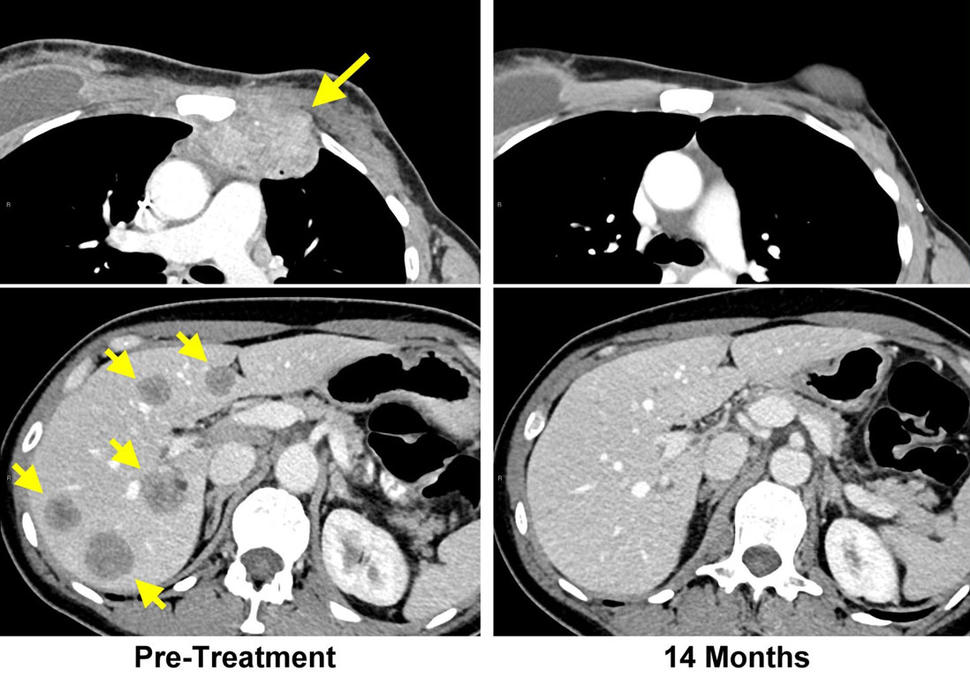New approach to immunotherapy leads to complete response in breast cancer patient unresponsive to other treatments
- Posted:
240-760-6600

Left: CT scans of a woman with breast cancer before TIL therapy show a lesion invading the chest wall (top) and metastatic lesions in the liver (bottom). Right: Scans 14 months after treatment show all lesions have disappeared.
Credit: National Cancer Institute
A novel approach to immunotherapy developed by researchers at the National Cancer Institute (NCI) has led to the complete regression of breast cancer in a patient who was unresponsive to all other treatments. This patient received the treatment in a clinical trial led by Steven A. Rosenberg, M.D., Ph.D., chief of the Surgery Branch at NCI’s Center for Cancer Research (CCR), and the findings were published June 4, 2018 in Nature Medicine. NCI is part of the National Institutes of Health.
“We’ve developed a high-throughput method to identify mutations present in a cancer that are recognized by the immune system,” Dr. Rosenberg said. “This research is experimental right now. But because this new approach to immunotherapy is dependent on mutations, not on cancer type, it is in a sense a blueprint we can use for the treatment of many types of cancer.”
The new immunotherapy approach is a modified form of adoptive cell transfer (ACT). ACT has been effective in treating melanoma, which has high levels of somatic, or acquired, mutations. However, it has been less effective with some common epithelial cancers, or cancers that start in the lining of organs, that have lower levels of mutations, such as stomach, esophageal, ovarian, and breast cancers.
In an ongoing phase 2 clinical trial, the investigators are developing a form of ACT that uses tumor-infiltrating lymphocytes (TILs) that specifically target tumor cell mutations to see if they can shrink tumors in patients with these common epithelial cancers. As with other forms of ACT, the selected TILs are grown to large numbers in the laboratory and are then infused back into the patient (who has in the meantime undergone treatment to deplete remaining lymphocytes) to create a stronger immune response against the tumor.
A patient with metastatic breast cancer came to the trial after receiving multiple treatments, including several chemotherapy and hormonal treatments, that had not stopped her cancer from progressing. To treat her, the researchers sequenced DNA and RNA from one of her tumors, as well as normal tissue to see which mutations were unique to her cancer, and identified 62 different mutations in her tumor cells.
The researchers then tested different TILs from the patient to find those that recognized one or more of these mutated proteins. TILs recognized four of the mutant proteins, and the TILs then were expanded and infused back into the patient. She was also given the checkpoint inhibitor pembrolizumab to prevent the possible inactivation of the infused T cells by factors in the tumor microenvironment. After the treatment, all of this patient’s cancer disappeared and has not returned more than 22 months later.
“This is an illustrative case report that highlights, once again, the power of immunotherapy,” said Tom Misteli, Ph.D., director of CCR at NCI. “If confirmed in a larger study, it promises to further extend the reach of this T-cell therapy to a broader spectrum of cancers.”
Investigators have seen similar results using mutation-targeted TIL treatment for patients in the same trial with other epithelial cancers, including liver cancer and colorectal cancer. Dr. Rosenberg explained that results like this in patients with solid epithelial tumors are important because ACT has not been as successful with these kinds of cancers as with other types that have more mutations.
He said the “big picture” here is this kind of treatment is not cancer-type specific. “All cancers have mutations, and that’s what we’re attacking with this immunotherapy,” he said. “It is ironic that the very mutations that cause the cancer may prove to be the best targets to treat the cancer.”
The research team includes Nikolaos Zacharakis, Ph.D.; Steven A. Feldman, Ph.D.; and Stephanie L. Goff, M.D.
For more on the clinical trial, see: https://clinicaltrials.gov/ct2/show/NCT01174121
About the Center for Cancer Research (CCR): CCR comprises nearly 250 teams conducting basic, translational, and clinical research in the NCI intramural program—an environment supporting innovative science aimed at improving human health. CCR’s clinical program is housed at the NIH Clinical Center—the world’s largest hospital dedicated to clinical research. For more information about CCR and its programs, visit ccr.cancer.gov.
About the National Cancer Institute (NCI): NCI leads the National Cancer Program and NIH’s efforts to dramatically reduce the prevalence of cancer and improve the lives of cancer patients and their families, through research into prevention and cancer biology, the development of new interventions, and the training and mentoring of new researchers. For more information about cancer, please visit the NCI website at cancer.gov or call NCI’s Contact Center (formerly known as the Cancer Information Service) at 1-800-4-CANCER (1-800-422-6237).
About the National Institutes of Health (NIH): NIH, the nation's medical research agency, includes 27 Institutes and Centers and is a component of the U.S. Department of Health and Human Services. NIH is the primary federal agency conducting and supporting basic, clinical, and translational medical research, and is investigating the causes, treatments, and cures for both common and rare diseases. For more information about NIH and its programs, visit nih.gov.